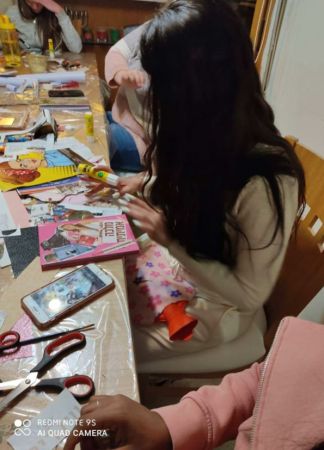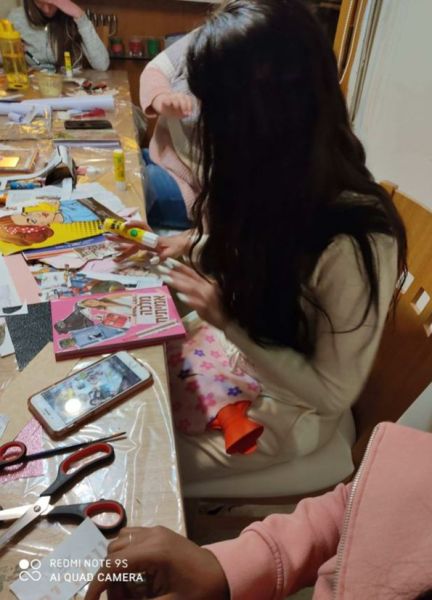Art as Therapy
Report on the use of support made possible through the PPO Foundation
(Jan 2021)
“Art enables us to find ourselves and lose ourselves at the same time.” -- Thomas Merton
Background on the grant
Based in Jerusalem but serving national needs, Israel NGO Hut HaMeshulash provides practical, emotional, vocational, and residential assistance for high-risk teens and young adults (ages 14-25) including high-school dropouts; the homeless; those addicted to drugs and alcohol; youth who may have turned to crime and prostitution to support themselves; abuse victims; and others. What began in 1999 as a modest grassroots effort to provide basic needs, led to establishment of a multi- venue organization with the infrastructure to offer lifeline assistance to more than 900 people annually, positively altering the downward trajectory of their lives.
Hut HaMeshulash is adept at identifying new ways to reach the sometimes hidden worlds of the youn
g people in our care. Art as Therapy, in partnership with the Bezalel Academy of Arts and Design, allows us to provide a range of art classes for high-risk youth. The initiative introduces the young person to art history as well as the basic elements of art (color, line, shape, form, and texture) and teaches a variety of techniques such as drawing, painting, print making, mosaics, etc. In 2020, a challenging year given the pandemic, the PPO Foundation helped Hut HaMeshulash facilitate the program with a generous grant of€11,850. Below is a report on the use of that grant.
The project
Goals: Art as Therapy is central to Hut HaMeshulash’s holistic approach of assisting the young person journey from darkness into light. The initiative is intended to introduce youth to art history as well as the basic elements of art (color, line, shape, form, and texture) and teaches a variety of techniques such as drawing, painting, print making, mosaics, etc. Our goal at the front end of the grant was to provide twice weekly art classes for 8-15 high-risk teens, a goal which was modified somewhat owing to the pandemic. The goals as outlined in our application were to help the individual to:
• Create art for the sake of personal enjoyment
• Process and express hard to reach emotions
• Develop self-awareness, encourage self-expression, and increase a sense of self-esteem
• Reconcile conflicts
• Manage stress and anxiety
• Connect to others and offer an alternative to the street life
While art therapy can be an excellent form of treatment for those with artistic experience, it is also frequently of therapeutic benefit to those who have never explored their artistic side. Hut HaMeshulash invites all who might find it helpful to participate. As with all Hut HaMeshulash programs, Art as Therapy includes a strong social work component.
Outcomes:
• On average 8-10 youth (17-25) participated twice weekly with a total of 80 participating throughout the year.
• Each class lasted 2 hours.
• A variety of art was created across a number of disciplines, including drawing, painting, and sculpture
• Lectures focused on technique and art history
• Courses were led by two professional staff and a rotation of five art students enrolled in the prestigious Bezalel Academy of Arts and Design
• All participants reported satisfaction with the experience as evidenced by regular participation, enthusiasm for the project, individual feedback, and staff reporting.
Challenges arising from and value created owing to the pandemic
It did not take long for the pandemic to reveal underlying challenges faced by high-risk young people, many opting to flee their homes as they found sheltering-in-place more dangerous than street life. Indeed, the situation triggered an immediate and significant increase in demand for services from young people suffering depression, anxiety, and loneliness; sexual abuse and self- harm; and hunger. It is particularly noteworthy that while other in-person outreach programs were forced to shutter during the first wave of the pandemic, Hut HaMeshulash was the only organization in Jerusalem authorized to provide in-person drop-in assistance for youth and young adults in various risk situations.
During the shutdown, all music programming was put on hold as we modified outreach to best address the profound humanitarian needs arising from the pandemic. By the time that shutdown was lifted in June, we had made the logistical adjustments required to safely welcome back youth for nearly all enrichment programming, including all art activities, which today are conducted in small capsules of no more than 10 people at a time. And while the pandemic has precluded our capacity to mount any exhibitions this past year, we found our programming to be a productive avenue to increase resilience, engagement, and critical thinking.
Thank you, PPO, for believing in the power of this project!












